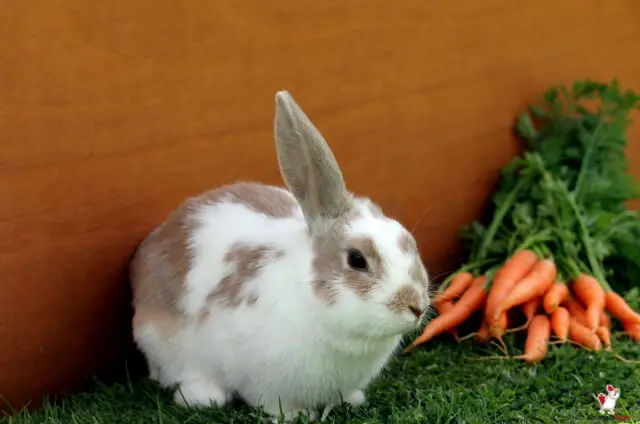Well, the widespread belief that rabbits love lettuce and carrots is only a half-truth or an outright lie. A rabbit’s favorite food is a balanced diet – one that has lots of hay, fruits, veggies, water, and pellets here and there. If you want to introduce any other favorite, you need to be pretty careful about it since a rabbit’s digestive tract is quite delicate. If anything wrong happens, you may need to get to an exotic vet – and they aren’t many of them out there.
Let us look at rabbits’ favorite food in detail. The read will open you up to a bunny’s dietary needs – the info that you need for your rabbit to lead a healthy life.
The Favorites Themselves
Favorite One: Hay
If you’re drawing a rabbit’s food pyramid, hay will form the base. About 90% of a bunny’s diet should be long-stemmed fiber. Rabbits are grazers, meaning that you need to provide fresh hay each morning.
Let’s get a little specific about the type of hay. For a rabbit, the best kinds are the grass hays, and they include oat, orchard, timothy, and brome hay. You can either choose any of the hays or mix them, provided that you give them fresh. If you’re buying from a farmer, ensure that it isn’t dusty or moldy – those things could sicken your cute bunny.
And what about alfalfa hay? I say no, simply because it is more of a legume and less of a grass. Too many legumes mean that the rabbit will be opened up to many unbreakable proteins in its system. But you can feed the alfalfa hay once in a while when you choose to treat the rabbit.
Also, young rabbits (under one year) can feed on alfalfa hay, at least until they are weaned.
Favorite Two: Pellets
This is yet another food that bunnies need more than carrots and lettuce. The most popular rabbit pellets are timothy hay pellets, and those should be fed limitedly. If you’re dealing with an adult rabbit (about 8 pounds of weight), provide about 25% (quarter) of a cup every day. Any rabbit under 5 pounds (the smaller breeds) should eat only 12.5% (eighth) of a cup.
Large breeds like the Flemish Giant will be okay with between a quarter and half a cup. The underline detail is that while the pellets are beneficial, they are not essential.
Young rabbits – tiny kits, still weaning – should eat alfalfa pellets that have high fiber content. As you go shopping, avoid the pellets which have seeds, nuts, and dried corns. This is because you could feed the rabbits with toxic ingredients. In such situations, things can quickly become lethal if the rabbit does not get quick vet attention.
Favorite Three: Veggies
Many rabbit owners agree that both herbs and vegetables are a rabbit’s favorite foods. Many of the leafy greens available are rabbit-safe, but you should always check before you feed any.
The feeding guideline for veggies is that you shouldn’t give more than two cups every day – for adult rabbits. For under-five pounds and dwarf breeds, you should provide one cup. Also, you can either give one type of veggies or mix several while sticking to the serving guidelines.
But before you make veggies a regular addition to the diet, monitor how the rabbit receives it. If there are any signs of GI problems like diarrhea, stop the feed. Before you give any vegetables, always talk to your vet for expert advice.
Avoid root veggies like potatoes, some legumes, and seeds. These foods put rabbits in challenging positions when it comes to digestion, and that is something you wouldn’t want.
Here’s a tabulated list of the veggies and herbs that are safe for rabbits:
| Veggies | Herbs | Lettuces | Sprouts |
| Bell peppersBok choyBrussels sproutsCarrot topsCucumberEndiveEscaroleFennelRadish topsRadicchioOkra leavesZucchiniWheatgrassWatercress | SageRosemaryParsleyOreganoMintDillCilantroBasilThyme | ArugulaBoston bibbButterGreen leafRed leafRomaine | AlfalfaRadishClover |
And, here are the plants and veggies to give twice a week (at most) to a rabbit:
| Veggies | Flowers |
| Dandelion greens Collard greensCloverChardCarrotsBroccoli (leaves and stems only)KaleSpinach | RosePansyNasturtiumMarigoldHoneysuckleHibiscusEnglish daisyDianthusDaylilyChamomileCalendula |
Favorite Four: Fruits
Rabbits will love fruits, especially the juicy, tasty ones. So, be advised to feed them around twice every week. Whichever the fruit, the feeding should only be a tablespoon or two for every five pounds of the rabbit’s weight. And like with the leafy greens, fruits need to be limited.
Here are some of the fruits you should be looking at if you want to treat your rabbit
| The Fruits | ||
| Watermelon | Strawberries | Raspberries |
| Plum | Pineapple | Pear |
| Peach | Papaya | Orange |
| Nectarine | Melon | Grapes |
| Cranberries | Cherries (seedless) | Blueberries |
| Blackberries | Banana | Apple (seedless) |
Favorite Five: Fresh Water
Hydration is vital for many beings, and rabbits are not exceptional. Rabbits should always be hydrated, and the water they drink should be fresh all the time. As a good rabbit owner, you need to clean the bunny’s water bowls with water and soap.
Favorite Six: Treats
Like many of us (me included), bunnies have what we call sweet teeth or a sweet tooth. As you organize the rabbit food pyramid, you need to place treats at the top bracket. This implies that they should only be fed sparingly, and too much would be poisonous.
As you look at the treats for rabbits, avoid those with artificial coloring, added sugar, or any preservatives. Also, avoid anything that has humans written all over it.
Final Words: The Non-Favorites
As I slip out of this read, it is essential to mention the non-favorites. Since you already know all the favorite rabbit foods, here are some that rabbit might like but should not have – never in a million years:
| The Non-Favorites | |||
| YogurtRhubarbNutsCrackersCauliflowerAll human treats | Turnip greensPotatoesMustard greensCorn or corn-cob treatsCabbage | Sugar PeasLegumesChocolateBeet greens | SeedsPastaIceberg lettuceCerealBeans |
Now that we’re done with all the favorite rabbit things, why don’t we look at other rabbit-related topics? Pick any of the following articles and find your way to a new world of information:
4. Ideal Temperature For Rabbits
5. What Does A White Rabbit Mean?

I’m Christopher Benjamin, a dedicated Animal Nutritionist at Ethos Veterinary Health with a Bachelor of Science in Animal Science from Michigan State University. My lifelong passion for animals led me to establish AnimalsData.Com. Here, I share expert advice, educational resources, and inspiring stories to empower fellow pet lovers worldwide. Join our community as we celebrate the beauty and diversity of our beloved animal companions!
